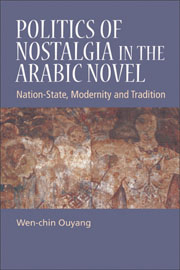6 - Story
from PART III - NARRATING THE NATION: TIME, HISTORY, STORY
Published online by Cambridge University Press: 05 August 2013
Summary
EPIC OF THE COMMON FOLK
Ḥarāfīsh provoked no controversy and generated less criticism. It seems universally liked by Mahfouz's critics. It has been variably called a utopian fantasy, ḥulm al-madīna al-fāḍila, Al-madīna al-fāḍila being al-Fārābī's description of ideal community; an epic of death and rebirth; an allegory of the search for metaphysical Truth and social justice; a national myth structured around an epic hero, recognised from the signs of his extraordinary birth, being orphaned very early in life, and his all-human traits; and even a magic-realist epic of man's search for social justice. It is all these and more. I have no intention of exhausting the other possible interpretations of this novel. I want to narrowly focus on its historical impulse, and look at it as a history of the nation-state, this time told from the perspective of the common folk, whom Mahfouz calls the ḥarāfīsh, after the name he gave to his close circle of friends which he borrowed from the Mumluk and a later designation of the rabble of Cairo's urban poor found in historical sources. Whatever group of the urban poor this term points to in Mahfouz's epic, whether an organised group of mendicants schooled in martial arts in the earlier sources or the general ruffians of the later material, this novel is primarily a family saga focused on the urban poor, particularly the unskilled class, and details its rise to prominence in society.
- Type
- Chapter
- Information
- Politics of Nostalgia in the Arabic NovelNation-State, Modernity and Tradition, pp. 184 - 223Publisher: Edinburgh University PressPrint publication year: 2013



